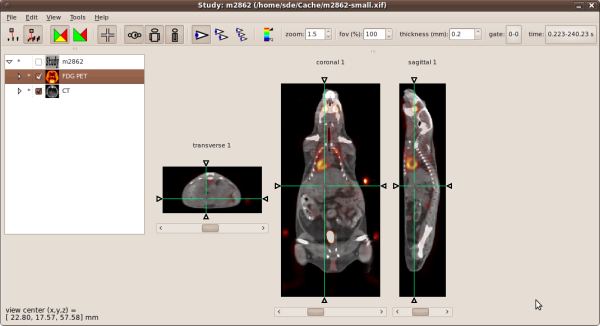A Medical Image Data Examiner (AMIDE) is an open source tool for viewing, analyzing, and registering anatomical and functional volumetric medical imaging data sets.
AMIDE has the ability to simultaneously handle multiple data sets imported from a variety of file formats, image fusion, 3D region of interest drawing and analysis, volume rendering, and rigid body alignments.
The software has been designed from the ground up with support for multi-modality imaging. AMIDE can work with and display a large number of objects simultaneous (limited only by available memory). These include data set, Regions of Interest, Fiducial Mark, and Study.
The software has been written on top of GTK+, and runs on any system that supports this toolkit.
Features include:
- Abitrary orientation, thickness, and time period slice viewing of a data set.
- Multiple data sets can be loaded and viewed at once, with either linked or fused views. Each data set can be viewed from any orientation. Fusing can be done by blending or overlay.
- Nearest Neighbor and Trilinear interpolation functions.
- Zooming.
- The following colormaps are supported: Black/White,White/Black,Red/Green/Blue Temperature, Hot Metal/Blue/Green, Spectrum, NIH/UCLA.
- Thresholding: data sets are thresholded independently. Data sets can be thresholded over the entire data set or over each slice.
- 3-dimensional ROI’s can be drawn directly on the images and statistics can be generated for these ROI’s. Currently supported ROI’s are ellipsoids, elliptic cylinder’s, boxes, and isocontours.
- Imports raw data files (8bit,16bit,32bit,float,etc). Also imports Acr/Nema 2.0, Analyze (SPM), DICOM 3.0, InterFile3.3, ECAT 6/7, and Gif87a/89a (using the (X)medcon/libmdc).
- Imports most clinical DICOM files (using the DCMTK library).
- Allows cropping and clearing regions of data sets.
- Anisotropic filtering wizard. Current filters: Gaussian, 1D Median, and 3D Median.
- Saves studies (ROI and Data Set data) as XML data.
- Series of slices can be viewed.
- Fly through movies can be generated as MPEG1 files.
- True volume rendering support with the capability of rendering multiple data sets at a time. Series of renderings can be saved as MPEG1 movies. Data sets can also be rendered as stereoscopic image pairs.
- Alignment Wizard. Alignment of data sets is supported using fiducial markers. This is done by placing fiducial reference points on the data sets to be aligned, and then running an alignment wizard to perform a rigid body transformation (procrustes method).
- A profile tool is included that can calculate gaussian fits and FWHM’s of the generated line profiles. Profiles can also be saved for external use.
Website: amide.sourceforge.net
Support: Documentation, FAQ, Mailing List
Developer: Andreas Loening
License: GNU General Public License v2.0

AMIDE is written in C. Learn C with our recommended free books and free tutorials.
| Popular series | |
|---|---|
| The largest compilation of the best free and open source software in the universe. Each article is supplied with a legendary ratings chart helping you to make informed decisions. | |
| Hundreds of in-depth reviews offering our unbiased and expert opinion on software. We offer helpful and impartial information. | |
| The Big List of Active Linux Distros is a large compilation of actively developed Linux distributions. | |
| Replace proprietary software with open source alternatives: Google, Microsoft, Apple, Adobe, IBM, Autodesk, Oracle, Atlassian, Corel, Cisco, Intuit, and SAS. | |
| Awesome Free Linux Games Tools showcases a series of tools that making gaming on Linux a more pleasurable experience. This is a new series. | |
| Machine Learning explores practical applications of machine learning and deep learning from a Linux perspective. We've written reviews of more than 40 self-hosted apps. All are free and open source. | |
| New to Linux? Read our Linux for Starters series. We start right at the basics and teach you everything you need to know to get started with Linux. | |
| Alternatives to popular CLI tools showcases essential tools that are modern replacements for core Linux utilities. | |
| Essential Linux system tools focuses on small, indispensable utilities, useful for system administrators as well as regular users. | |
| Linux utilities to maximise your productivity. Small, indispensable tools, useful for anyone running a Linux machine. | |
| Surveys popular streaming services from a Linux perspective: Amazon Music Unlimited, Myuzi, Spotify, Deezer, Tidal. | |
| Saving Money with Linux looks at how you can reduce your energy bills running Linux. | |
| Home computers became commonplace in the 1980s. Emulate home computers including the Commodore 64, Amiga, Atari ST, ZX81, Amstrad CPC, and ZX Spectrum. | |
| Now and Then examines how promising open source software fared over the years. It can be a bumpy ride. | |
| Linux at Home looks at a range of home activities where Linux can play its part, making the most of our time at home, keeping active and engaged. | |
| Linux Candy reveals the lighter side of Linux. Have some fun and escape from the daily drudgery. | |
| Getting Started with Docker helps you master Docker, a set of platform as a service products that delivers software in packages called containers. | |
| Best Free Android Apps. We showcase free Android apps that are definitely worth downloading. There's a strict eligibility criteria for inclusion in this series. | |
| These best free books accelerate your learning of every programming language. Learn a new language today! | |
| These free tutorials offer the perfect tonic to our free programming books series. | |
| Linux Around The World showcases usergroups that are relevant to Linux enthusiasts. Great ways to meet up with fellow enthusiasts. | |
| Stars and Stripes is an occasional series looking at the impact of Linux in the USA. | |
